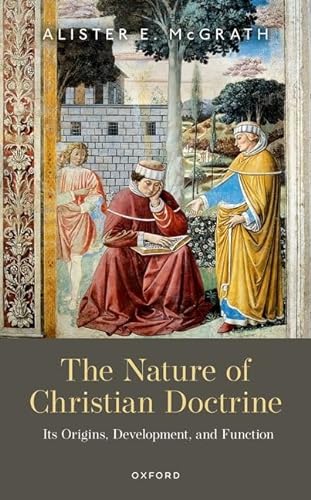

Most ebook files are in PDF format, so you can easily read them using various software such as Foxit Reader or directly on the Google Chrome browser.
Some ebook files are released by publishers in other formats such as .awz, .mobi, .epub, .fb2, etc. You may need to install specific software to read these formats on mobile/PC, such as Calibre.
Please read the tutorial at this link. https://ebooknice.com/page/post?id=faq
We offer FREE conversion to the popular formats you request; however, this may take some time. Therefore, right after payment, please email us, and we will try to provide the service as quickly as possible.
For some exceptional file formats or broken links (if any), please refrain from opening any disputes. Instead, email us first, and we will try to assist within a maximum of 6 hours.
EbookNice Team

Status:
Available5.0
14 reviews
ISBN 10: 0198901445
ISBN 13: 9780198901440
Author: Emeritus Professor of Science and Religion Alister E McGrath
A groundbreaking account of the origins, development, and enduring significance of Christian doctrine, explaining why it remains essential to the life of Christian communities. Noting important parallels between the development of scientific theories and Christian doctrine, Alister E. McGrath examines the growing view of early Christianity as a 'theological laboratory'. We can think of doctrinal formulations as proposals submitted for testing across the Christian world, rather than as static accounts of orthodoxy. This approach fits the available evidence much better than theories of suppressed early orthodoxies and reinforces the importance of debate within the churches as a vital means of testing doctrinal formulations. McGrath offers a robust critique of George Lindbeck's still-influential Nature of Doctrine (1984), raising significant concerns about its reductionist approach. He instead provides a more reliable account of the myriad functions of doctrine, utilising Mary Midgley's concept of 'mapping' as a means of coordinating the multiple aspects of complex phenomena. McGrath's approach also employs Karl Popper's 'Three Worlds', allowing the theoretical, objective, and subjective aspects of doctrine to be seen as essential and interconnected. We see how Christian doctrine offers ontological disclosure about the nature of reality, while at the same time providing a coordinating framework which ensures that its various aspects are seen as parts of a greater whole. Doctrine provides a framework, or standpoint, that allows theological reality to be seen and experienced in a new manner; it safeguards and articulates the core vision of reality that is essential for the proper functioning and future flourishing of Christian communities.
1. On the Origins of Christian Doctrine
Doctrine, Dogma, and Theology: Some Preliminary Reflections
Paradigm Shifts and the Emergence of Christianity
Christian Doctrine: A New Way of Seeing Things
Metanoia: A Holistic ‘Change of Mind’
A New Imagining of the Scriptures of Israel
Christian Doctrine: A New Manner of Living
2. Theorizing the Identity of Christ: On Early Christian Doctrinal Development
The Quest for the ‘Best Explanation’ of the Evidence
The Metaphor of an Early Christian ‘Theological Laboratory’
Charles Taylor on the Quest for the ‘Best Account’
Questioning Bauer’s Approach to Heresy and Orthodoxy
‘Good Science’ and ‘Orthodoxy’: Problematic Historical Categories
Doctrinal Development: Criteria of Theory Choice
Athanasius on Testing Theological Theories
3. The Functions of Christian Doctrine
George Lindbeck on The Nature of Doctrine
Mary Midgley on Mapping a Complex Reality
Doctrine and Christian Identity: Focus and Boundaries
Doctrine and the Interpretation of Experience
Doctrine as a Bridge between Past and Present
Doctrine as a Marker of Social Identity
Doctrine and Ecumenism
4. The Three Worlds of Christian Doctrine: Theoretical, Objective, and Subjective
Karl Popper’s Three Worlds: Theoretical, Objective, and Subjective
Doctrine as Articulation: Engaging Charles Taylor
The Problem of Abstraction in Doctrine
Awe and Glory: A Stimulus to Theoretical Reflection
Doctrine and Poetry: Affect and Cognition in George Herbert
The Incarnation: Objective and Subjective Themes
5. Seeing the Face of God: On the Doctrine of the Incarnation
Aniconism_ The ‘Image Ban’ in the Old Testament
Aniconism and Early Christianity
Incarnation and Image: The Move Away from Aniconism
The Incarnation and the Face of God
Christ as the Embodiment of Meaning
The Incarnation and Suffering
6. Doctrine: Ontological Disclosure and Coordinating Framework
Epistemic and Ontic Explanations in the Natural Sciences
The Incarnation as Ontological Disclosure
The Incarnation as a Coordinating Framework
The Incarnation as an Intellectual Abstraction?
Ontic and Epistemic Aspects of the Doctrine of the Trinity
7. The Doctrine of Salvation: Coherence, Comprehensiveness, and Theological Mapping
On Theorizing the Atonement: The Problem of Intellectualization
Coherence and Comprehensiveness as Theological Virtues
The Doctrine of Salvation: Mapping the Benefits of Christ
A Problem? Anselm of Canterbury on ‘Satisfaction’
Imagining and Articulating Salvation: Four New Testament Metaphors
The Coherence and Complexity of Salvation
Conclusion
Bibliography
the nature of doctrine
the doctrine of the christian life pdf
the nature of christian freedom
what is the doctrine of christ pdf
the book of nature and the book of scripture
a christian doctrine
Tags: Emeritus Professor of Science and Religion Alister E McGrath, Nature, Christian